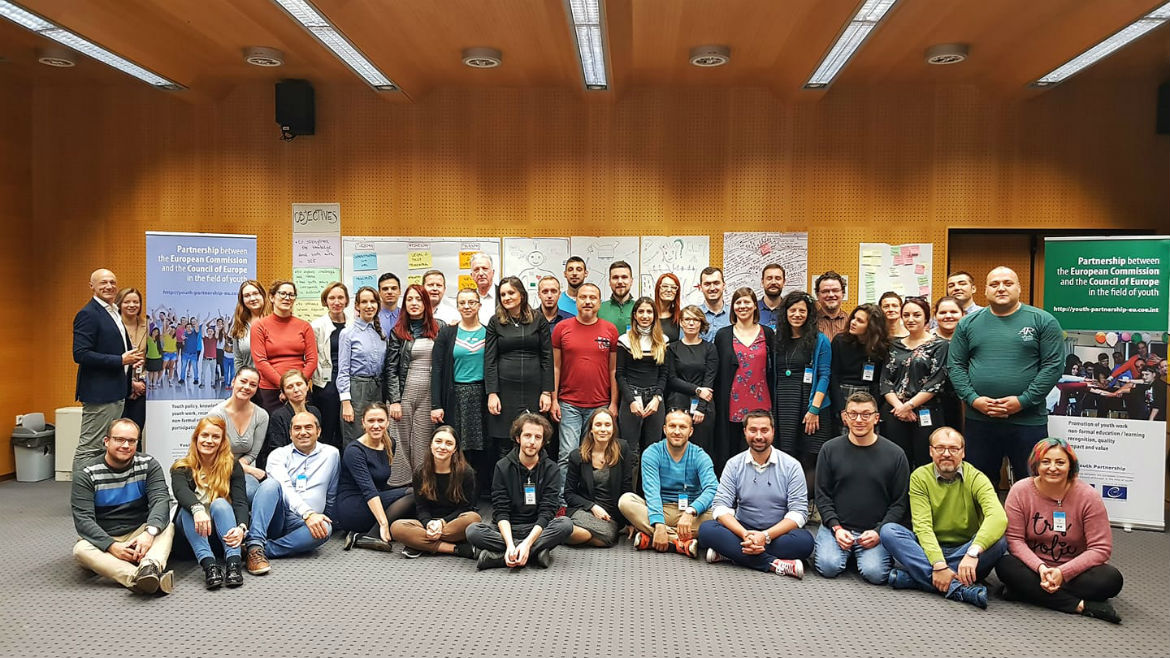The EU – CoE youth partnership, in co-operation with the Office of the Republic of Slovenia for Youth, with SALTO SEE Resource Centre and with the Regional Youth Cooperation Office (RYCO) organised on 13 to 15 November a peer-learning seminar on youth work, as an opportunity to deepen the discussion on the state of youth work in the region and to promote a wide range of European support instruments, mechanisms and tools.
Building on developments in the region, the activity aimed to make a contribution to strengthening youth work in the region, by analysing its state of play and identifying the support needed from youth work policy, and in turn considered the crucial role that youth work can play in supporting youth policy at different levels.
The seminar objectives are:
- to strengthen the knowledge about youth work in South East Europe;
- to explore current challenges and needs that youth work as a field has in SEE and how youth policy can respond to them, at different levels, through frameworks, capacity building, and support tools;
- to enhance synergies between different relevant actors in the region for the development of the youth work sector;
- to analyse the crucial role that youth work can play in supporting youth policy at different levels.
The event gathered 55 participants, representing the triangle of youth work practice, policy and research.
Background information
Increasing knowledge and supporting the development of youth work and youth policy in SEE has been for several years one of the objectives of the EU-CoE youth partnership. In this framework, the EU-CoE youth partnership organised in 2016 the peer-learning seminar ‘Getting Across’, which brought together 55 participants involved in youth policy and youth work, particularly in the Western Balkans. The event reaffirmed the role of youth work in supporting young people in exclusion situations and generated guidelines for increasing the quality and impact of cross-sectoral youth policies and youth services.
From 2017 onwards, EU-CoE youth partnership has carried out a research project on the educational paths of youth workers, which aims to collect data and analyse the formal and non-formal education paths and career steps of youth workers, as contribution to the quality development in the youth work field.
Moreover, youth work is today very prominent in the priorities and processes of the Council of Europe and of the European Commission.
At regional level, the Berlin process aims from 2014 to foster stability and security in Europe through stronger links with and support for the Western Balkans region. In the youth field, it led to an increased importance of the youth sector in relation to the policy agenda and more opportunities for youth work in the region. It also led to the creation of the Regional Youth Cooperation Office (RYCO) for enhancing youth mobility in the Western Balkans region.
In addition to these events, an Action Plan for youth work and youth policy was defined at the first Europe-Western Balkans Youth Meeting in Ljubljana in 2016[1]. The meeting emphasised the contribution of youth work to support European integration and especially to promote youth participation, civic engagement and youth mobility. Such action plan included the topics European citizenship, youth participation, social inclusion, youth employment, combatting radicalisation and extremism, and dealing with the past.
During the second Europe-Western Balkans Youth Meeting, Podgorica, 23-25 May 2018, participants put together messages and recommendations to decision makers, European institutions and actors of the youth work field. They highlighted the role of youth work in relation to youth participation and engagement, social inclusion, mobility and civic/citizenship education, and reaffirmed the need for a European dimension in youth work in the region.
Furthermore, there are several recent tools available for youth work, such as those developed by experts groups coordinated by the European Commission (the toolkit on preventing violent radicalisation of young people and the handbook ‘Improving youth work – your guide to quality development’), those developed by the EU-CoE youth partnership (e.g. the recent study on youth work combating violent radicalisation, the revised T-kits European citizenship and Intercultural learning; the handbook for youth work with young refugees) and the tools on quality in learning mobility developed in the framework of the European Platform on Learning Mobility (EPLM). The seminar will be an opportunity to disseminate these tools to the youth work sector in SEE.
Slovenia, furthermore, has established, over the years, a strong youth sector and a well-developed cooperation within South-East Europe in different policy areas affecting youth, while its Office for Youth has been fond of deepening regional cooperation in the field of youth, contributing to the implementation of the Council of Europe Recommendation on youth work.
[1] The Youth Meeting was organised by MOVIT, the Slovenian National Agency for Erasmus+, youth field, and, as part of it, the SALTO South East Europe Resource Centre, in partnership with the Austrian, German and Turkish National Agencies for Erasmus+, youth field, in close communication with the European Commission and with the support of the Ministry for Foreign Affairs of the Republic of Slovenia.

